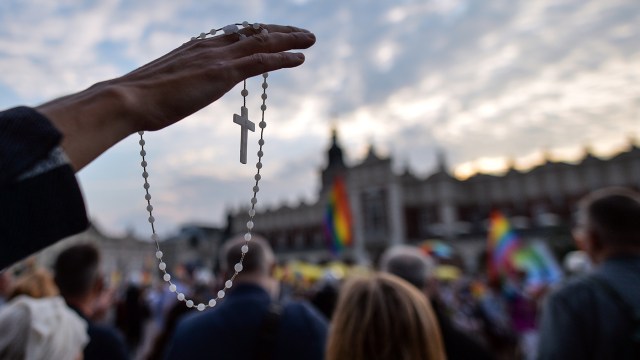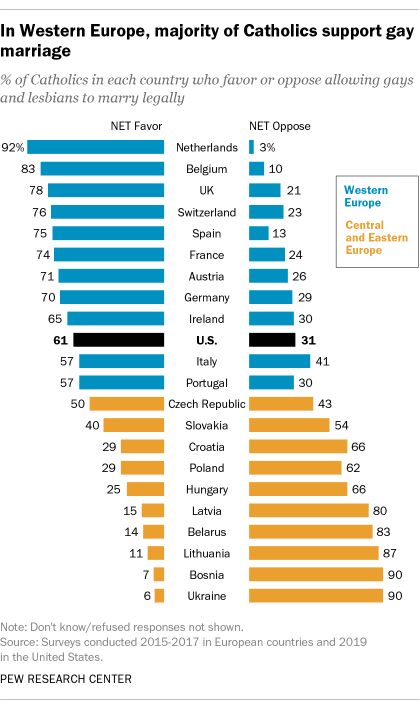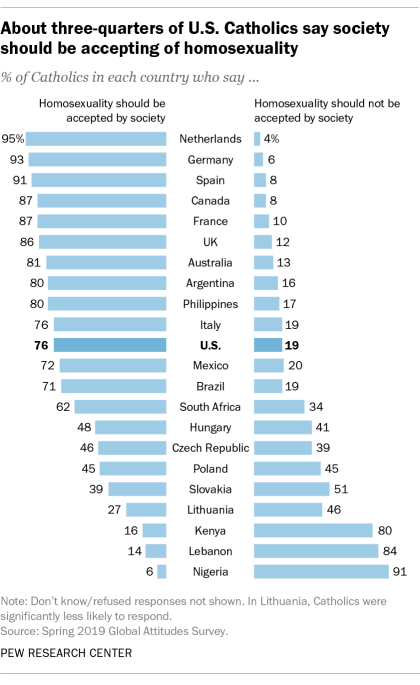
Pope Francis made news recently by voicing his support for same-sex civil unions – legal arrangements that give gay and lesbian couples many of the same rights as married opposite-sex couples. The statement struck many observers as a shift for the Vatican – which in 2003 came out against any “legal recognition of homosexual unions” – even as Francis did not change his long-standing opposition to gay marriage.
Around the world, Catholics vary in their support for same-sex marriage and their acceptance of homosexuality in general, according to Pew Research Center surveys conducted in recent years. (The Center does not have recent survey data on views about civil unions.)
In the United States, about six-in-ten Catholics (61%) said in a 2019 survey that they favor allowing gays and lesbians to marry. Same-sex marriage became legal across the U.S. following a Supreme Court ruling in 2015.
In Western Europe, large majorities of Catholics said in 2017 that they support legal same-sex marriage. That was the case in the Netherlands (92%), the United Kingdom (78%), France (74%) and Germany (70%).
In the wake of Pope Francis’ recent comment about same-sex civil unions, Pew Research Center conducted this analysis to better understand what Catholics around the world think about legal recognition for same-sex couples and homosexuality in general. The data in this analysis comes from four different Pew Research Center surveys.
The views of Catholics in Western Europe about same-sex marriage come from a phone survey of 15 countries conducted from April to August 2017. Catholic samples were large enough for analysis in 11 of these countries: Austria, Belgium, France, Germany, Ireland, Italy, the Netherlands, Portugal, Spain, Switzerland and the United Kingdom. The total sample size of Catholics across these countries was 10,027. Here are the questions used, along with responses, and the survey’s methodology. The Center’s survey of Slovakia – including 954 Catholic respondents – was fielded alongside the countries in Western Europe.
The views of Catholics in Central and Eastern Europe about same-sex marriage come from a survey conducted from June 2015 to July 2016 through face-to-face interviews in 18 countries. Catholic samples were large enough for analysis in nine of these countries: Belarus, Bosnia, Croatia, the Czech Republic, Hungary, Latvia, Lithuania, Poland and Ukraine. The total sample size of Catholics across these countries was 6,375. Here are the questions used, along with responses, and the survey’s methodology.
The views of Catholics in the United States about same-sex marriage come from a phone survey conducted March 20 to 25, 2019. The sample size in this survey was 288 Catholics. Here are the questions used, along with responses, and the survey’s methodology.
Responses about whether society should be accepting of homosexuality came from a global survey conducted from May 13 to Aug. 14, 2019, across 22 of 34 countries where Catholic samples were large enough for analysis: Argentina, Australia, Brazil, Canada, the Czech Republic, France, Germany, Hungary, Italy, Kenya, Lebanon, Lithuania, Mexico, the Netherlands, Nigeria, the Philippines, Poland, Slovakia, South Africa, Spain, the United Kingdom and the United States. The total sample size of Catholics across these countries was 10,394 of 24,444 respondents. The term “homosexuality,” while sometimes considered anachronistic in the current era, is the most applicable and easily translatable term to use when asking this question across societies and languages and has been used in other cross-national studies, including the World Values Survey. Here are the questions used, along with responses, and the survey’s methodology.
Same-sex marriage is legal in most of the Western European countries surveyed. In Switzerland and Italy – which allow civil unions but not marriage for gay couples – 76% and 57% of Catholics, respectively, said in 2017 that they support gay marriage.
On the other hand, in almost all of the Central and Eastern European countries surveyed by the Center in 2015 and 2016, most Catholics oppose same-sex marriage. Nine-in-ten Catholics in Ukraine said same-sex marriage should be illegal, as did 66% of Catholics in Hungary and 62% of Catholics in Poland. Most nations in Central and Eastern Europe do not allow legal same-sex unions of any kind.
When it comes to Catholics’ views about homosexuality in general, a global survey conducted in 2019 also paints a mixed picture. (While the survey covered 34 countries, samples of Catholics were large enough to analyze in 22 of those countries.)
In the Americas, majorities of Catholics in several countries said society should be accepting of homosexuality. That was the case in Canada, where almost nine-in-ten Catholics (87%) took this view, as well as in Argentina (80%), the U.S. (76%), Mexico (72%) and Brazil (71%). Other countries around the world where most Catholics said society should be accepting of homosexuality included Spain (91%), Australia (81%), the Philippines (80%) and South Africa (62%).
In Eastern Europe, acceptance was weaker, with roughly half or fewer of Catholics saying that homosexuality should be accepted by society in Hungary, the Czech Republic, Poland, Slovakia and Lithuania. (In Lithuania, however, 27% of Catholics did not respond to the question.)
In some of the other surveyed countries, including in Africa and the Middle East, large majorities of Catholics said homosexuality should not be accepted by society. That was the case in Nigeria (91%), Lebanon (84%) and Kenya (80%).
The global survey found that Catholics within many countries generally are as accepting as their non-Catholic compatriots of homosexuality. This is not true in all countries, though. In Argentina, Brazil, Germany, Mexico and the Philippines, Catholics are somewhat more likely than non-Catholics to say that homosexuality should be accepted by society. And in Poland, Catholics are less likely than non-Catholics to say homosexuality should be accepted by society.
The Catholic Church teaches that “homosexual acts are intrinsically disordered” and calls on gay people to practice “chastity,” though it also calls on Catholics to treat gay men and women with “respect, compassion and sensitivity.”


